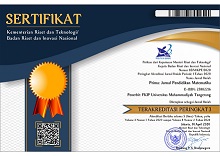IMPROVING STUDENTS' MATHEMATICAL CRITICAL THINKING ABILITIES USING LKPD WITH THE PROBLEM BASED LEARNING MODEL
Abstract
The aim of this research is to improve students' critical mathematical thinking skills by combining LKPD with a problem-based learning (PBL) approach. A two-cycle classroom action research methodology was used in this research. Research findings show that students' critical thinking abilities increased from cycle I to cycle II. Based on observation data, it is known that students' critical thinking abilities have increased. For example, in cycle I students were able to formulate the core of the problem with an increase of 53.33%, and in cycle II the same ability increased to 72.33%. Apart from that, in cycle I students were able to solve a problem with relevant information by 59.66%, and in cycle II this percentage increased to 87.33%, choosing arguments that were logical, relevant and accurate was 72.33% and increased to 94.66%, students were able to identify tendencies that might emerge based on different points of view in cycle I as much as 63.66% and increased to 89.33%, students analyzed the consequences of a decision or statement taken in cycle I as much as 71.33% and increased to 86.39%. The learning process and evaluation results show that class VIII A students of SMP Negeri 1 Gondang can improve their critical thinking skills by using LKPD learning through the PBL paradigm. The aim of this project is to improve students' critical mathematical thinking skills by integrating LKPD with problem-based learning (PBL) methodology.
Full Text:
PDFDOI: http://dx.doi.org/10.31000/prima.v8i3.11845
Article Metrics
Abstract - 908 PDF - 339Refbacks
- There are currently no refbacks.
Prima: Jurnal Pendidikan Matematika
Program Studi Pendidikan Matematika
Fakultas Keguruan dan Ilmu Pendidikan
Universitas Muhammadiyah Tangerang
Jl. Perintis Kemerdekaan I/33, Cikokol
Kota Tangerang, Indonesia
e-mail: primajpm@gmail.com
Prima: Jurnal Pendidikan Matematika (p-ISSN: 2579-9827 | e-ISSN: 2580-2216) is licensed under a Creative Commons Attribution 4.0 International License.







